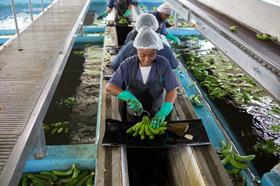
The Fairtrade Foundation may spend its fair share of time and money in marketing the campaign to consumers, but there is plenty of work being done behind the scenes to engage suppliers.
Under the umbrella theme ‘don’t feed exploitation’, the organisation is this year focusing on the buyer’s responsibility to protect the workers in their supply chain.
This is becoming more and more important thanks to increasing expectations from consumers to meet ethical standards, and in light of new legislation such as last year’s Modern Slavery Act, explains Leena Camadoo, banana supply chain manager at Fairtrade Foundation.
“Effectively it is retailers who make the choice,” she says. “Sainsbury’s, Co-op and Waitrose have all their bananas fully certified by Fairtrade and have had this for some years. Tesco only has one SKU but it has made various public commitments to pay a living wage. “We want to encourage best practice across the industry, but I would say wages are only one of the issues. In some cases, the public services such as health and education are really poorly funded, so even if you have a decent wage you can’t raise yourself out of poverty.” The Fairtrade strategy from 2016 has been to cover five commodities, coffee, tea, bananas, cocoa and flowers, says Camadoo, in order to make a bigger impact by focusing in depth on fewer products.
Compliance in bananas focuses on workers’ rights, improving wages and supporting farmer cooperatives. “We also certify Fairtrade pineapples from Ghana and we have done some green beans. It’s an open system, anyone could ask for new standards to be created,” she adds.
The scheme is able to help communities more robustly through its dual system of a minimum price, and the premium placed on all certified products, which can be used by producer cooperatives to fund various public services. This can be anything from schools, school equipment, scholarships or constructing buildings for classrooms, explains Camadoo, who says the system is designed to build a strong and enduring supply chain.
The plethora of audits is a common complaint for many in the produce industry, and Camadoo says Fairtrade has been looking into partnering with other certification bodies to consider the possibility of working together to cut time and costs.
“The problem is auditor training as they have to be aware how the farm operates and not just ask questions,” she says. “Some audits look for different things. One of the good things about Fairtrade is that the cost of the audit should be covered by the minimum price, which is set to cover all costs of production.”
The pressure on margins, especially on key price war products such as bananas, means there is little capacity to invest in sustainability, whether that is environmental or social. But Camadoo says there has “definitely” been a move towards ethical certification, with other marks such as Rainforest Alliance joining this sector of the market.
“The Rainforest Alliance does have some ethical compliance built in. But the fact it has no minimum price means it doesn’t protect from market fluctuations, although the consumer doesn’t realise this, so it’s definitely appealing for retailers.
“My fear is how do you protect against issues in the banana supply chain without investing to do so. For example, health and safety equipment is a significant investment for plantations to make. Having said that, we’d like to see an industry that moves towards more ethical certification, so any move is a good thing.”
Protecting worker rights and maintaining ethical standards are crucial aspects of any functioning supply chain, and certification schemes such as Fairtrade remain one of the most effective ways of achieving this.



